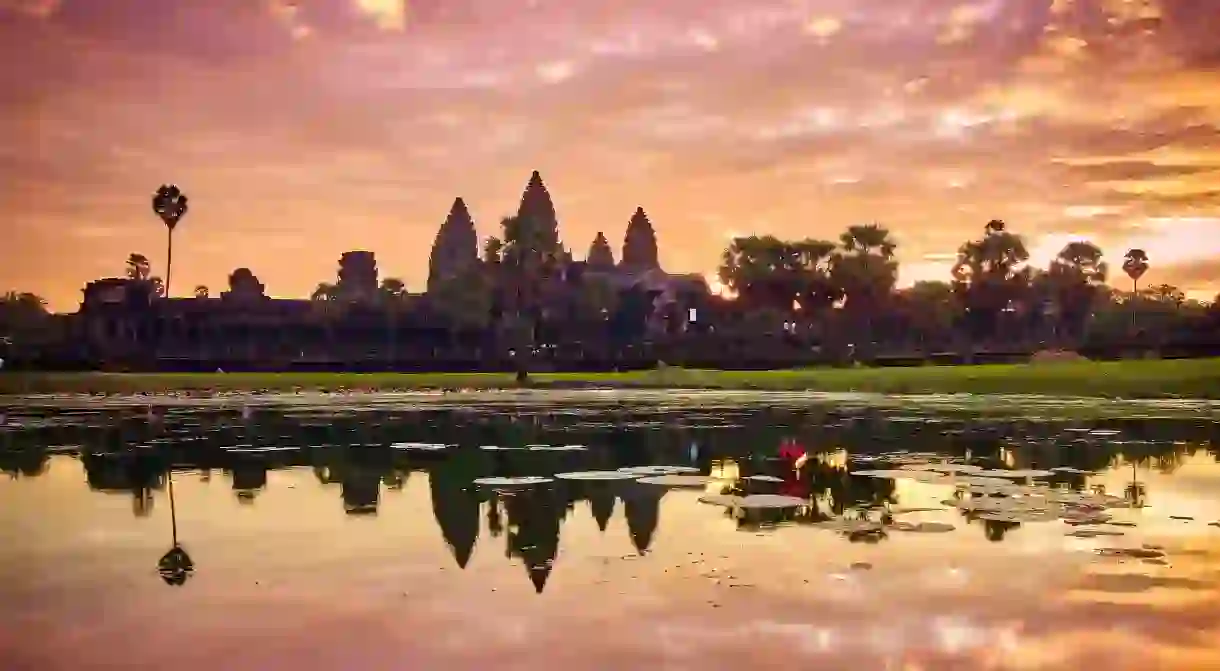26 Essential Khmer Phrases You'll Need in Cambodia

If you’re heading to Cambodia, then picking up a few phrases in Khmer, the Cambodian language, is a good idea. While many Cambodians (especially younger ones) can speak pretty good English, knowing a few phrases in Khmer could well warm the hearts of locals and bring about a few smiles and – even better – deals. Here are the Khmer language phrases to swot up on during your visit.
Preparing for your trip? Make your visit all the more special with the help of a local guide on one of these trips, tours and experiences in Cambodia?
Basic Khmer greetings and essentials
Chom reap sour [chom-reap-sore] – Hello (formal)
Cambodians have an extremely respectful culture, with elders and those of a higher social standing greeted using this more formal way of saying hello.
Susadei [soos-a-day] – Hello (informal)
This is a more informal Khmer greeting that is used between peers or friends. It is also accompanied with a sampeah (a small bow with the hands together).
Soksaby [soks-a-bye] – How are you and I am fine
It may seem strange, but the Khmer way of asking “how are you?” and the response “I’m fine” is the same.
Chom reap lear [chom-reep-lear] – Goodbye (formal)
Again, this is the formal way to say goodbye in situations where respect is required. Don’t forget to throw in a smile.
Lee hi [lee-hi] – Goodbye (informal)
This is the more commonly used and casual way to wave goodbye.
Bah [bah] – Yes (male)
Jah [chaa] – Yes (female)
You’ll hear a lot of “bah, bah, bah” from Cambodian men and “chaa chaa chaa” from women – usually said several times.
Ot teh [ot-tei] – No
Learning how to say no will come in very handy for turning down the tuk tuk drivers you’ll face as soon as you arrive in the country.

Arkun [ar-koon] – Thank you
A polite “thank you” always goes a long way, wherever you are in the world.
Som dtoh [som-toe] – Sorry/ Excuse me
This is another useful phrase that is well worth picking up before you land in the country.
Directions
Baht schweng [bart-shweng) – Turn left
Baht saddam [bart-sadam) – Turn right
A tuk tuk is likely to be your main mode of transport in Cambodia so learning a few phrases will come in handy.
Chop [chop] – Stop
You can throw a “som” (please) in front of it to be polite.
Tini [tinny] – Here
Why not place some of your newly learned words together to say “please stop here” or “som chop tini“.
Da trong [da-trong] – Go straight
Another handy phrase when your tuk tuk driver looks like he wants to take a wrong turn.
At the restaurant/bar
Chhnang [ch-nang] – Delicious
Cambodians love talking about food, so saying something is “delicious” will bring about a smile.
Som tach [som tack] – Water please
Cambodia’s heat means staying hydrated is essential.
Knyom khleam [knoym-kleam] – I’m hungry
If you grasp this phrase, then you’ll soon find yourself being ushered to the nearest restaurant or street stall.
Som ket loy [som-ket-loy] – The bill please
Cambodians don’t often use the word “please” or “som” so this can be dropped for speed.

At the market
Bo man [bow-man] – How much?
Picking up a few phrases to take to the market with you will be rewarded with much better prices when bartering.
T’lay [t-lay] – too expensive
You’ll definitely need this one if you want to haggle. Place more emphasis at the end of “lay” to highlight your level of horror.
Moi, bee, bai, boum, bram, bram moi, bram bee, bram boum, dop – numbers from one to 10.
Getting to grips with counting is a good way to get around, as streets tend to be numbered rather than named in Cambodia.
Making friends
Chhmua ei? [cham-moo-ey] – What is your name?
This is an essential phrase for forging friendships with locals.
Knyom chhmua ___ [knyom-cham-moo] – My name is ___
And, of course, you need to know how to say your own name back.
Knhom srolanh nak [khnhom-sralanh-anak] – I love you
If making friends goes really well, you’ll want to learn how to say “I love you”. This is the gender-neutral way of saying I love you in Khmer.













